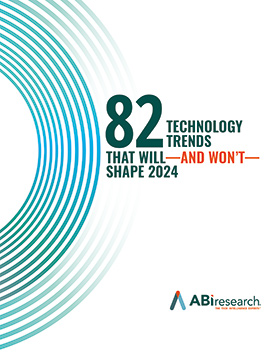

As 2024 kicks off, predictions abound on the technology innovations expected in the year ahead. However, according to global technology intelligence firm ABI Research, several highly anticipated advancements, including Enterprise 5G, mainstream foldable devices, network APIs and robotaxis, will not happen in 2024.
In its new whitepaper, 82 Technology Trends That Will − and Will Not − Shape 2024, ABI Research analysts identify 45 trends that will shape the technology market and 37 others that, although attracting vast amounts of speculation and commentary, are less likely to move the needle over the next 12 months.
“When we look at the backdrop for 2024, we are still seeing many of the 2023 trends impacting fortunes,” says Stuart Carlaw, chief research officer at ABI Research. “High inflation, cost pressures, and reduced demand continue. Major markets like the US, Germany and China face extended manufacturing recessions. Monetary policy’s focus on curbing inflation hampers tech funding. Yet there are signs of hope: inflation is dropping, central bank policies might change, and job markets could recover. The global political landscape is the one outlier not on the trajectory to positive movement. That withstanding, 2024 could be a watershed year as we collectively turn a corner. It won’t be smooth, and it won’t be linear, but 2024 holds the promise of technology providing the acceleration engine to move us out of the past few years in the doldrums.”
What won’t happen in 2024?
Enterprise 5G: 5G will fail to attract enterprise interest, again. In deciding about investments in connectivity technologies, enterprises are much more interested in use cases and outcomes than in the name of the connectivity technology, especially because the implementing enterprises are not connectivity technology experts.
Mainstream foldable devices: Despite the best efforts of many in the industry to make the user experience of foldable devices more acceptable − including thinner and lighter designs, better hinges, crease-free displays, fold and flip form factors, and larger cover screens − they have yet to convince consumers and capture their imaginations.
Network APIs: Network APIs, driven by GSMA’s Open Gateway and CAMARA initiatives, is not likely to create significant business opportunity, suffering the very same fate as GSMA’s OneAPI project in 2012, which was abandoned soon after it was launched. The same problems that faced network Application Programming Interfaces (APIs) a decade ago remain today. Application developers are already addressing their needs through either aggregators or hyperscalers. Releasing fancy new network API initiatives will not automatically attract developer attention.
Generative AI at the edge
Most enterprises will be looking to deploy generative AI through the cloud, with only a handful having the capability and resources to deploy generative AI at the enterprise edge level. The challenge here will be in selecting a good use case, deploying the correct generative AI framework and model, and balancing ROI expectations. The potential of enterprise generative AI is huge, but 2024 will not be the year to see widespread deployments of generative AI at the edge.
Robotaxis
Robotaxi operations will not gain traction in 2024. The complexity of unsupervised autonomous driving is becoming increasingly apparent, particularly in interactions with road users. The ongoing reaction and investigation into the causes of the recent Cruise accident and Cruise’s actions following this accident is likely to bring a greater degree of scrutiny to robotaxi deployments in 2024, representing a significant headwind for unsupervised autonomous driving.
What will happen in 2024
Looking at the technology space, there are some clear trends that ABI can foresee:
• Artificial Intelligence (AI) will be a driver. It will permeate, improve and optimise many functions as the landscape moves to smaller models and open innovation.
• Reduced Capability (RedCap) will come to the fore as a solution to watch to achieve lower power consumption, device simplicity, and lower cost in 5G.
• There will be accelerated mixed reality (MR) interest.
• Post quantum cryptography (PQC) will see initial ROI accelerated in limited deployments, to make cryptographic systems secure against both quantum and classical computers.
• We will see the emergence of ‘pop-up’ metaverse solutions for limited industrial applications.
• Low earth orbit (LEO) and satellite-to-cellular markets will grow significantly.
• Sustainability reporting will spur a sustainability software market.
• Wi-Fi 7 will receive much attention.
“We hope that this serves as a helpful blueprint for building realistic expectations of key technology markets,” says Carlaw. “ABI Research is privileged to sit in a powerful position between the tech innovator communities and those companies looking to utilise technology in their operations.”
To view the full report visit www.instrumentation.co.za/ex/abi_trends.pdf
For more information contact ABI Research, +44 203 326 0140, www.abiresearch.com
© Technews Publishing (Pty) Ltd | All Rights Reserved